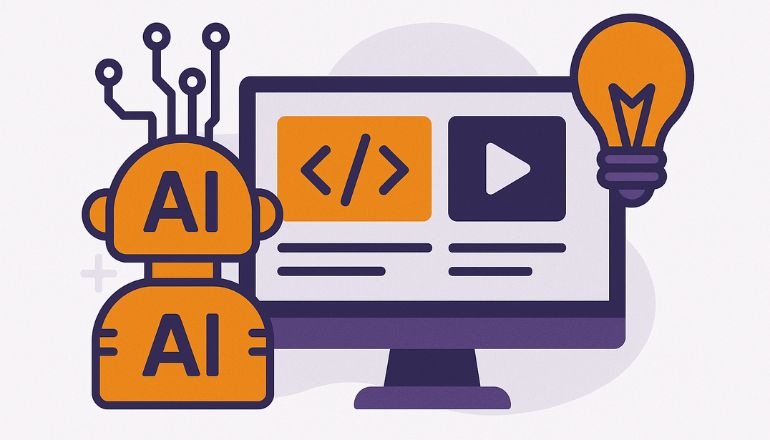
AI for Web Design and Development: The Future of Smart Websites
In the ever-evolving world of web development, keeping up with the latest tools and technologies is essential. AI for Web Design and Development is no longer a futuristic concept it’s here, transforming how websites are built and experienced. From simplifying complex tasks to enabling hyper-personalized user experiences, AI is revolutionizing the entire web design process. But is it the right solution for your next project? In this guide we’re going to explore how AI is reshaping web development and whether it’s the tool you need to stay competitive.
Read More: Use Artificial intelligence in digital marketing
What is AI in Web Design and Development?
AI in web design and development is transforming how websites are created, optimized, and maintained. By leveraging artificial intelligence, designers and developers can automate repetitive tasks, enhance user experience, and create more efficient websites. Let’s break down how AI is revolutionizing this field.
BOOST YOUR SEO PERFORMANCE
Smart AI-powered tools to grow your traffic faster
How AI is Used in Web Design
AI is being used in web design to automate various aspects, from layout creation to visual adjustments. AI-powered tools can analyze user behavior and preferences to suggest design elements that improve user engagement and overall experience. For example, AI-based design tools like Adobe Sensei can help with content placement, color schemes, and even image selection, making the design process quicker and more intuitive. AI is also used in adaptive web design, where websites automatically adjust based on the user’s device and browsing habits.
Benefits of AI in Web Development
AI brings numerous benefits to web development, including:
- Improved Efficiency: AI can automate repetitive tasks such as coding, testing, and debugging, freeing up developers to focus on more creative and complex challenges.
- Personalization: AI algorithms analyze user data to deliver personalized content and experiences, enhancing engagement and conversion rates.
Enhanced User Experience: AI can optimize site navigation, load speeds, and overall usability, ensuring that visitors have a seamless browsing experience. - Predictive Maintenance: AI can identify potential issues on a website before they become problems, helping developers take proactive measures to prevent downtime.
AI-Powered Website Builders
The rise of AI for Web Design and Development has introduced innovative website builders that make creating websites faster and more accessible. These AI-powered platforms leverage machine learning to simplify the design process, offering customizable templates, automated adjustments, and seamless integration. Let’s explore how AI is shaping the future of website creation.
Best AI Website Builders
Several AI-powered website builders are making waves, enabling users to create professional websites without needing coding expertise. Some of the top platforms include:
- Wix ADI (Artificial Design Intelligence): Wix’s AI tool automatically generates a website based on user preferences and industry specifications. It offers customizable designs and allows for quick adjustments without coding.
- Bookmark’s AiDA: AiDA (Artificial intelligence Design Assistant) uses AI to create fully functional websites in a matter of minutes, tailoring the design to the user’s needs.
- The Grid: An AI-driven website builder that automatically adjusts the layout, content, and style of a website to fit user inputs, offering a unique and dynamic design experience.
AI for E-commerce Websites
AI is also transforming the e-commerce sector by helping businesses create personalized, user-friendly online stores. Here’s how AI is used in e-commerce websites:
- Product Recommendations: AI algorithms analyze browsing history and preferences to recommend products to users, increasing the likelihood of conversions.
- Chatbots: AI-powered chatbots provide instant customer support, guiding users through product selections, answering queries, and enhancing the shopping experience.
- Dynamic Pricing: AI can adjust pricing based on demand, competition, and other factors, ensuring businesses remain competitive and maximize profits.
- Customer Behavior Analytics: AI tracks and analyzes customer behavior on e-commerce sites to optimize product displays, site navigation, and marketing strategies.

AI in UI/UX Design
AI is playing a pivotal role in shaping the future of UI/UX design by improving how users interact with websites and applications. From streamlining design processes to offering hyper-personalized experiences, AI is transforming the design landscape to enhance user satisfaction. Let’s dive into how AI is reshaping UI/UX design.
How AI Enhances User Experience
AI is enhancing user experience (UX) by making websites more intuitive and responsive. It analyzes user data to predict preferences and optimize interactions, ensuring a seamless journey. Key AI-driven features like voice recognition and smart search help users navigate sites more easily, while AI chatbots offer instant support, addressing user concerns in real-time. These tools create a more personalized and enjoyable experience for visitors.
AI-Driven Personalization in Web Design
Personalization is one of the most powerful uses of AI in web design. AI analyzes user behavior, preferences, and interactions to tailor the design and content of a website in real time. For example, websites can adjust layouts, color schemes, or featured content based on a user’s previous visits or purchase history, increasing engagement and conversion rates. AI-powered personalization ensures that each visitor experiences a website uniquely suited to their needs.
AI in A/B Testing for Web Performance
AI has significantly improved the way A/B testing is conducted on websites. Traditionally, A/B testing required manually splitting traffic and analyzing performance metrics, but AI has automated and optimized this process. By using machine learning algorithms, AI can quickly identify the best-performing variations, analyze user interactions, and predict outcomes. This reduces the time and resources needed for testing while ensuring more accurate results. AI-driven A/B testing leads to faster insights and improvements in web performance.
The Future of AI in Web Development
The future of AI for Web Design and Development is full of potential, with innovations continually reshaping how websites are created and maintained. As AI technology evolves, it’s bringing more automation and intelligence to web development, making it faster, smarter, and more efficient. Let’s take a look at some of the upcoming trends in this field.
AI and No-Code Website Development
A major shift in web development is the rise of no-code platforms powered by AI, enabling users with little to no technical expertise to build functional websites. These platforms leverage AI to automate design processes and provide real-time recommendations, making it easier to create websites without any coding knowledge.
- Webflow and Bubble are prominent examples of AI-driven no-code platforms.
- These platforms allow users to build fully customizable websites using drag-and-drop features.
- AI optimizes site performance, ensuring that sites are fast and user-friendly without the need for manual technical adjustments.
Will AI Replace Web Developers?
AI will not fully replace web developers, but it will transform their role. Rather than taking over jobs, AI will automate repetitive tasks, freeing developers to focus on more complex and creative challenges. AI will assist with tasks like coding, testing, debugging, and optimizing, but developers will still be essential for customizing and refining web solutions.
Conclusion: Should You Use AI for Web Design?
AI is revolutionizing web design, offering faster and more efficient ways to create websites. From automated design to personalized user experiences, AI tools make web development easier and more accessible. However, while AI can handle many tasks, human creativity remains essential for crafting unique and innovative websites. If you’re looking to streamline processes and enhance user experience, AI can be a valuable asset but it should complement, not replace, creative expertise.
FAQ
How is AI used in web design and development?
AI is used to automate design processes, generate layouts, suggest color schemes, optimize user experiences, and even write code, making website creation faster, more efficient, and user-friendly.
What are smart websites?
Smart websites are AI-driven platforms that adapt content, design, and functionality based on user behavior, preferences, and interactions, providing personalized and optimized experiences.
How does AI improve user experience on websites?
AI analyzes visitor behavior, predicts user needs, personalizes content recommendations, optimizes navigation, and enhances page load performance, resulting in a smoother and more engaging user experience.
Can AI generate website content automatically?
Yes. AI tools can generate text, images, and even interactive elements tailored to the website’s goals, maintaining consistency in design and messaging while saving time.
Are there risks associated with AI in web design?
Potential risks include over-reliance on AI leading to less human creativity, AI-generated errors, and ethical concerns about automated decision-making. Human oversight is essential.
Really insightful article! I’m curious do you think AI will eventually be able to fully handle UI/UX design for complex platforms like healthcare or finance, where user behavior can be highly specialized?
Interesting read! Just saw that Webflow is beta-testing a new AI co-designer tool for no-code builds. It’s wild how fast this space is evolving.
The part about AI-driven A/B testing really stood out. That kind of efficiency is a game changer for small teams